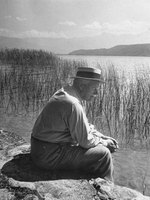
“Jung and Old Age: Standing at the River”
Lecture and Workshop by Howard W. Tyas, Jr.
At the end of his autobiography, Memories, Dreams, Reflections, Jung shares a “Retrospect” in which he rejects any claims that he is wise or should be considered a sage. Instead, Jung tells a simple, self-referential story about a man who once dipped a hatful of water from a stream, and then asked, “So what?” What follows are his honest and insightful reflections upon his life – a man well into his eighties.
Central to Jung’s life, as well as to his work, is the process he referred to as individuation: the unfolding of one’s unique personality. In a real sense it begins for every human being at birth with one's first breath. It continues as we make our way through life – learning, risking, failing, adjusting, relating, working – but always hearing our muse’s call (or is it a siren’s?), however faintly. Eventually, just as the body begins to slow its pace and the world takes on a different shade, the time for pondering and integration creeps in. One is entering that territory of the individuation journey we sometimes refer to simply as “old age.”
Friday evening lecture: Dr. Tyas will begin by revisiting Jung’s theory of individuation as a whole; not only in human development, but also as a universal process observable throughout the natural world. Dr. Tyas will then turn our attention to those later stages of life that we consider “old age” by examining experiences from Jung’s life, literary images from Herman Hesse’s Siddhartha, dream material from individuals of advancing years, and the tell-tale signs that accompany growing older. Although this is a process many of us will experience, how we experience it depends on and reflects the distinctive character within each human psyche.
Saturday workshop: Our exposure to the presence of older adults is ever-present, whether we have grandparents, older friends and neighbors, or are making this passage ourselves. This workshop begins with a search through our earliest years for that personal “acorn” that foreshadowed the unique personality we now embody. We will then gently address the wounds, the regrets, the bucket lists, and the still-to-be-travelled journeys left before us as we weave our way toward integration. We will ponder those dreams which have acted as ushers, guides and midwives during our later years. And hopefully, by the end, we will have some appreciation for how far we have come and of what still lies before us, as Jung suggested, “as if we had centuries to live.”
Lecture and Workshop by Howard W. Tyas, Jr.
At the end of his autobiography, Memories, Dreams, Reflections, Jung shares a “Retrospect” in which he rejects any claims that he is wise or should be considered a sage. Instead, Jung tells a simple, self-referential story about a man who once dipped a hatful of water from a stream, and then asked, “So what?” What follows are his honest and insightful reflections upon his life – a man well into his eighties.
Central to Jung’s life, as well as to his work, is the process he referred to as individuation: the unfolding of one’s unique personality. In a real sense it begins for every human being at birth with one's first breath. It continues as we make our way through life – learning, risking, failing, adjusting, relating, working – but always hearing our muse’s call (or is it a siren’s?), however faintly. Eventually, just as the body begins to slow its pace and the world takes on a different shade, the time for pondering and integration creeps in. One is entering that territory of the individuation journey we sometimes refer to simply as “old age.”
Friday evening lecture: Dr. Tyas will begin by revisiting Jung’s theory of individuation as a whole; not only in human development, but also as a universal process observable throughout the natural world. Dr. Tyas will then turn our attention to those later stages of life that we consider “old age” by examining experiences from Jung’s life, literary images from Herman Hesse’s Siddhartha, dream material from individuals of advancing years, and the tell-tale signs that accompany growing older. Although this is a process many of us will experience, how we experience it depends on and reflects the distinctive character within each human psyche.
Saturday workshop: Our exposure to the presence of older adults is ever-present, whether we have grandparents, older friends and neighbors, or are making this passage ourselves. This workshop begins with a search through our earliest years for that personal “acorn” that foreshadowed the unique personality we now embody. We will then gently address the wounds, the regrets, the bucket lists, and the still-to-be-travelled journeys left before us as we weave our way toward integration. We will ponder those dreams which have acted as ushers, guides and midwives during our later years. And hopefully, by the end, we will have some appreciation for how far we have come and of what still lies before us, as Jung suggested, “as if we had centuries to live.”